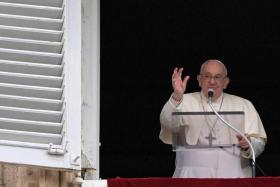He claims Chinese wealth is 'biggest problem'
Islamist leader accuses Indonesian president of favouring ethnic Chinese
JAKARTA: The leader of a powerful Indonesian Islamist organisation that led the push to jail Jakarta's Christian former governor has laid out plans for a new, racially-charged campaign targeting economic inequality and foreign investment.
In a rare interview, Mr Bachtiar Nasir said the wealth of Indonesia's ethnic Chinese minority was a problem and advocated an affirmative action programme for native Indonesians, comments that could stoke tensions that are already running high in the world's largest Muslim-majority nation.
"It seems they do not become more generous, more fair," the cleric said, referring to Chinese Indonesians, in the interview in an Islamic centre in South Jakarta.
"That's the biggest problem."
Ethnic Chinese make up less than 5 per cent of Indonesia's population, but they control many of its large conglomerates and much of its wealth.
Mr Nasir also said that foreign investment, especially from China, has not helped Indonesians in general.
Indonesia, South-east Asia's biggest economy, is a major destination for foreign investment in the mining and retail sectors.
Jakarta is also trying to lure investors for a US$450 billion (S$634b) infrastructure drive to revive economic growth.
"Our next job is economic sovereignty, economic inequality," said Mr Nasir, an influential figure who chairs the National Movement to Safeguard the Fatwas of the Indonesian Ulemas Council (GNPF-MUI).
"The state should ensure that it does not sell Indonesia to foreigners, especially China."
His group organised protests by hundreds of thousands of Muslims in Jakarta late last year over a comment about the Quran made by the capital's then governor, Basuki Tjahaja Purnama, popularly known by his Chinese nickname "Ahok".
The ethnic-Chinese Christian was found guilty this week of blasphemy and sentenced to two years in prison, raising concerns that belligerent hardline Islamists are a growing threat to racial and religious harmony in the secular state.
Mr Nasir, 49, used to have a late-night religious show on one of Indonesia's biggest TV networks. His contract was ended under government pressure after his role in the first anti-Ahok rally was revealed.
He spoke calmly during the interview, identifying other religiously-motivated objectives such as restricting alcohol to tourist areas, curbing prostitution and criminalising adultery and sodomy. He insisted he believes in a pluralist Indonesia.
Former president Suharto blocked Chinese Indonesians from many public posts and denied them cultural expression, forcing them to drop their Chinese names. Marginalised politically and socially, many turned to business and became wealthy.
ETHNIC WEALTH GAP
The ethnic wealth gap has long fed resentment among poorer "pribumi", Indonesia's mostly ethnic-Malay indigenous people. During riots that led to the fall of Suharto in 1998, ethnic-Chinese and Chinese-owned businesses were targeted, and about 1,000 people were killed in the violence.
There has been no blood-letting on that scale since then, but tensions have remained. President Joko Widodo was the subject of a smear campaign on the campaign trail in 2014 that falsely claimed he was a Chinese descendant and a Christian.
Mr Bonnie Triyana, a historian who has chronicled Chinese Indonesian experiences, said Mr Nasir was "scapegoating" the Chinese.
"It's very dangerous for our nation. It's playing with fire," said Mr Triyana, who is an indigenous Indonesian.
"They are spreading bad information to convince people that their role is to save the nation."
In the interview, Mr Nasir said "ethnic sentiment cannot be denied" when it comes to inequality, and the economic power of Chinese Indonesians needs to be addressed.
"The key is justice, and taking sides," he said.
"Justice can be applied if there is a preferential option for indigenous Indonesians from a regulation aspect and in terms of access to capital."
Neighbouring Malaysia, also a Muslim-majority nation with a wealthy Chinese minority, has long followed affirmative action policies that grant native Malays privileges, including job reservations in the civil service and discounts on property.
Responding to Mr Nasir's comments, Mr Johan Budi, a spokesman for Mr Widodo, said in a statement to Reuters that income inequality is high on the government agenda and Indonesian Chinese get no special treatment.
"It is not true this allegation that President Jokowi gives wider space to ethnic Chinese in Indonesia," Mr Budi said, referring to Mr Widodo by his nickname.
He said Mr Widodo's focus is on the poor, including "indigenous people". - REUTERS
Get The New Paper on your phone with the free TNP app. Download from the Apple App Store or Google Play Store now


